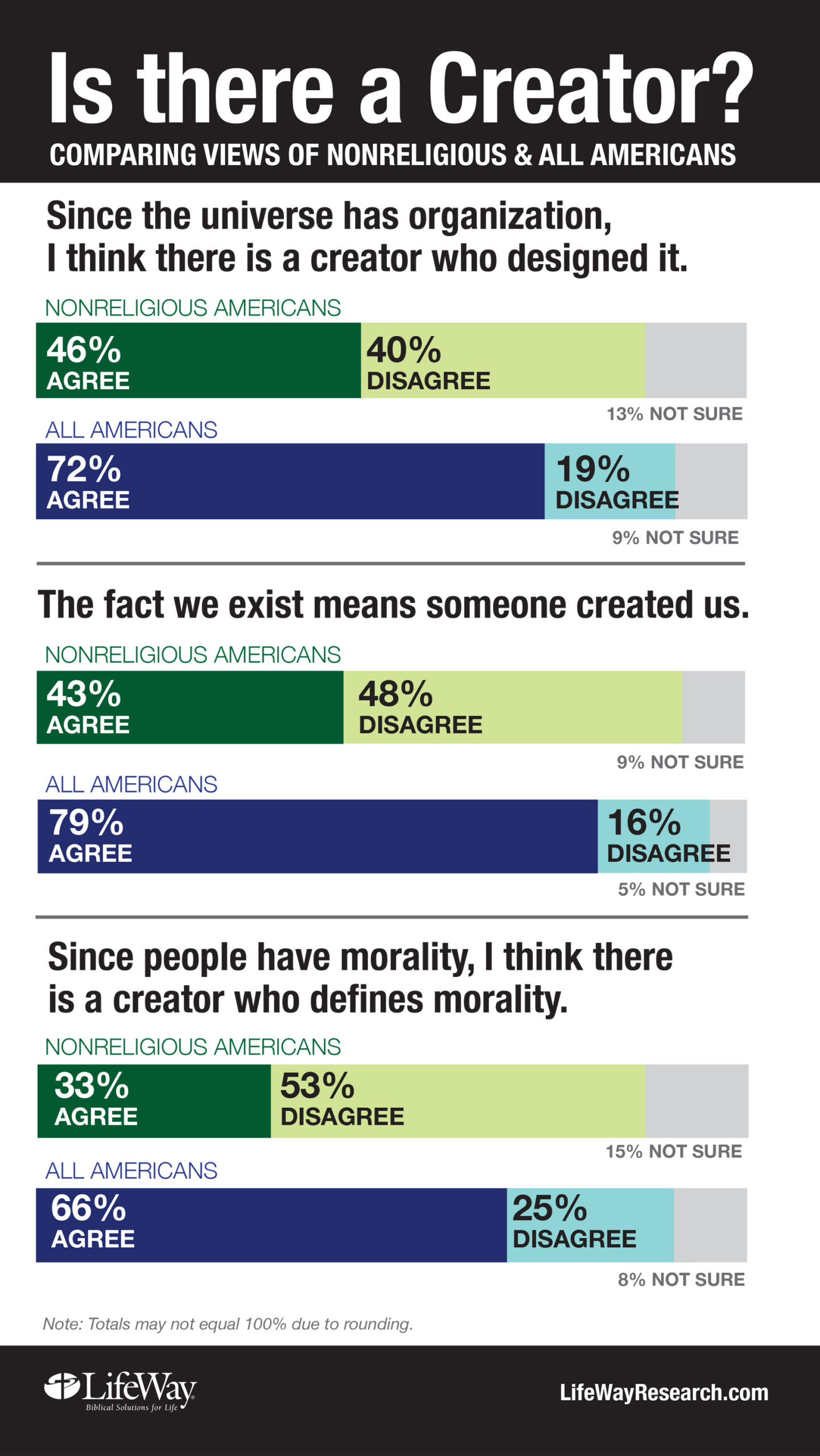
By Lisa Cannon Green
Life didn’t just happen, most Americans say—and a surprising number of nonreligious people agree.
More than 4 in 10 of the nonreligious believe physics and humanity point to a creator, Lifeway Research finds. A third say human morality indicates a creator who defines right and wrong.
And although the nonreligious are less likely than other Americans to see evidence of a creator, they are more likely to agree (46 percent) than disagree (40 percent) with the statement: “Since the universe has organization, I think there is a creator who designed it.”
Traditional evidences for belief in a creator resonate with most Americans, including many of the nonreligious, said Ed Stetzer, executive director of Nashville-based Lifeway Research.
“People who seek to set out reasons to believe, often called apologetics, have historically framed their argument in similar ways,” Stetzer said. “The large number of nonreligious people agreeing with some of these arguments points us to a surprising openness to classic apologetic arguments. Or, put another way, even nonreligious people are open to the idea there is a creator.”
Not blind chance
Human life and a complex universe are powerful indicators of creation, Americans say. In a survey of 1,000 Americans, Lifeway Research found almost 8 in 10 (79 percent) believe the existence of human life means someone created it, while 72 percent think the organization of the universe shows a creator’s design.
“The infinitesimal odds that life arose by blind chance is a formidable argument,” said Mary Jo Sharp, assistant professor of apologetics at Houston Baptist University, and an author and speaker in the field.
Americans are less certain whether a creator defines right and wrong. A smaller majority, 66 percent, says people’s moral values attest to a creator who determines morality.
“Similar moral threads across cultures are evidence for many that someone has imprinted a common standard upon the human conscience,” Stetzer said. “However, it is worth noting the moral argument has less sway here, perhaps because of our changing views on what is and is not moral.”
Religious differences
Many atheists, agnostics, and those with no religious preference find the existence of human life to be a persuasive argument for a creator, with 43 percent agreeing: “The fact that we exist means someone created us.” However, a larger share (48 percent) disagrees.
The existence of good and evil is a less compelling argument for the nonreligious. More than half (53 percent) disagree with the statement: “Since people have morality, I think there is a creator who defines morality.” Nevertheless, a third of the nonreligious (33 percent) think human morals point to a creator who defines right and wrong.
“The existence of good and evil is difficult to explain from an atheistic worldview, because in that view, there is no stable external grounding outside of humans for a standard of goodness,” Sharp said.
Not surprisingly, Christians—particularly evangelicals—overwhelmingly say they see compelling proof of a creator. As evidence, 91 percent of Christians and 95 percent of evangelicals point to the existence of humanity, while 81 percent of Christians and 85 percent of evangelicals cite the structure of the universe.
They are slightly less confident that the existence of morality proves a creator who determines moral values, with 77 percent of Christians and 83 percent of evangelicals saying human morals indicate a creator who defines right and wrong.
Age gap
Although most American adults of all ages believe in a creator, a sharp uptick emerges at midlife. On every measure, Americans 45 and older are more likely to see evidence of a creator than those 18-44.
The gap is widest on the question of morality. Three-quarters of those 45 and older agree the presence of human moral values indicates a creator who defines right and wrong, an opinion shared by only 57 percent of adults 44 and younger. Disagreement is twice as common among Americans 18-44 (34 percent) as those 45 and older (17 percent).
Younger Americans are also more likely than those 45 and older to believe human life may exist without a creator. Eighty-six percent of those 45 and older agree the presence of human beings points to a creator; only 1 in 10 disagrees. Among those 18-44, however, 72 percent believe human life is evidence of a creator and nearly a quarter (22 percent) disagree.
More than three-fourths of those 45 and older (77 percent) consider the orderliness of the universe to be a sign of a creator, a view held by two-thirds (66 percent) of those 18-44.
Lifeway Research also found differences by gender and geographic region.
Men (22 percent) are more likely than women (17 percent) to disagree that the structure of the universe points to a creator. Women, meanwhile, are more likely (85 percent) than men (73 percent) to believe the existence of human life means someone created it.
The survey found a surprising alignment of opinion between the usually dissimilar Northeast and South. Northeasterners (87 percent) and Southerners (82 percent) are more likely than those in the West (71 percent) to view the presence of human life as an indication of a creator. Similarly, those in the Northeast (72 percent) and South (69 percent) agree more often than Westerners (58 percent) that human morals point to a creator who defines morality.
Northeasterners (75 percent) and Southerners (74 percent) are also more likely than those in the Midwest (64 percent) to see the organization of the universe as evidence of creation.
“In an increasingly secular age, where the Christian faith has perhaps lost its home-field advantage, Christians will need to make their case for the creator and ultimately for the gospel,” Stetzer said. “It appears people—even nonreligious people—are indeed open to apologetics arguments, if Christians will actually make them.”

Methodology:
The phone survey of Americans was conducted Sept. 26-Oct. 5, 2014. The calling utilized Random Digit Dialing. Sixty percent of completes were among landlines and 40 percent among cell phones. Maximum quotas and slight weights were used for gender, region, age, ethnicity, and education to more accurately reflect the population. The completed sample is 1,000 surveys. The sample provides 95 percent confidence that the sampling error does not exceed plus or minus 3.5 percent. Margins of error are higher in sub-groups. Those labeled evangelicals consider themselves “a born again, evangelical, or fundamentalist Christian.”








